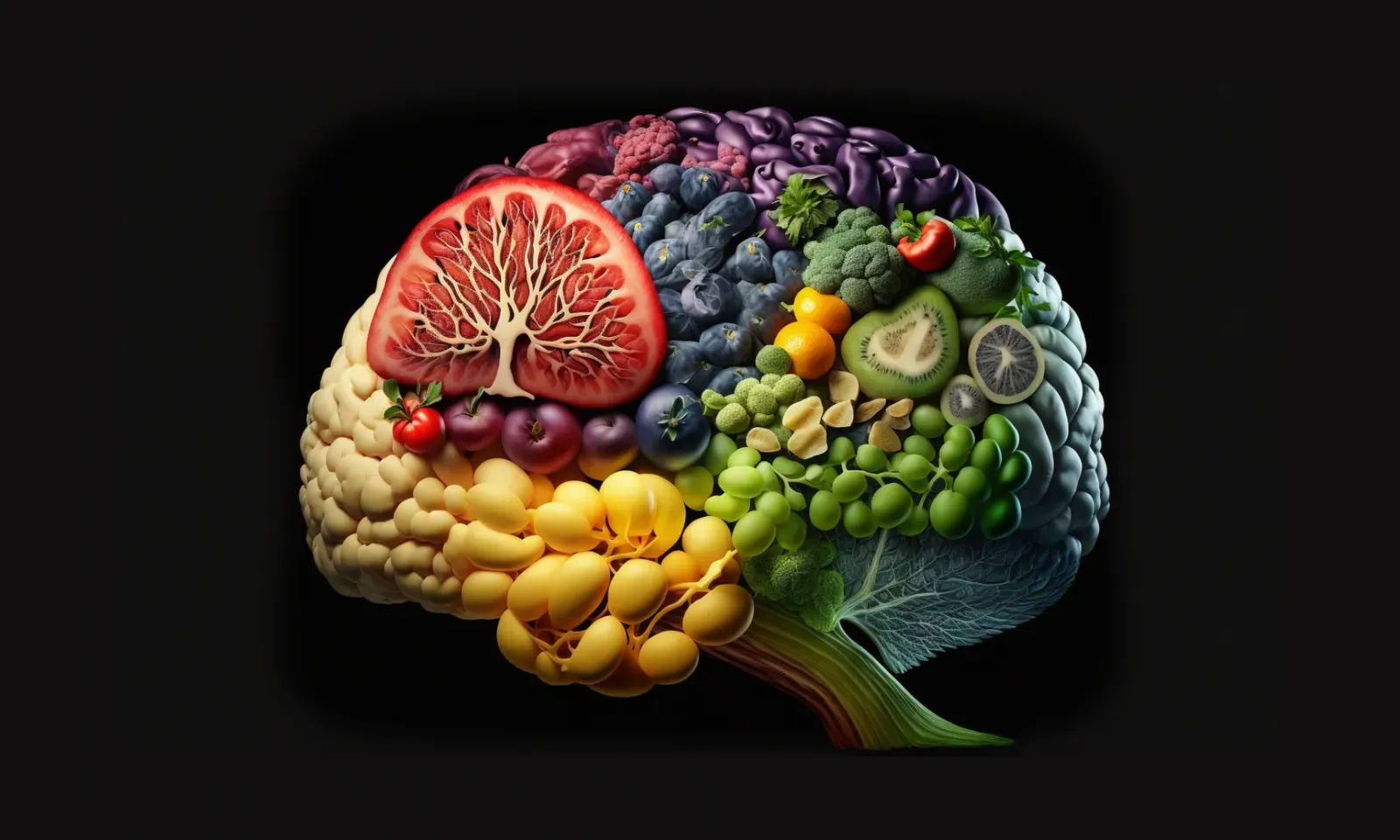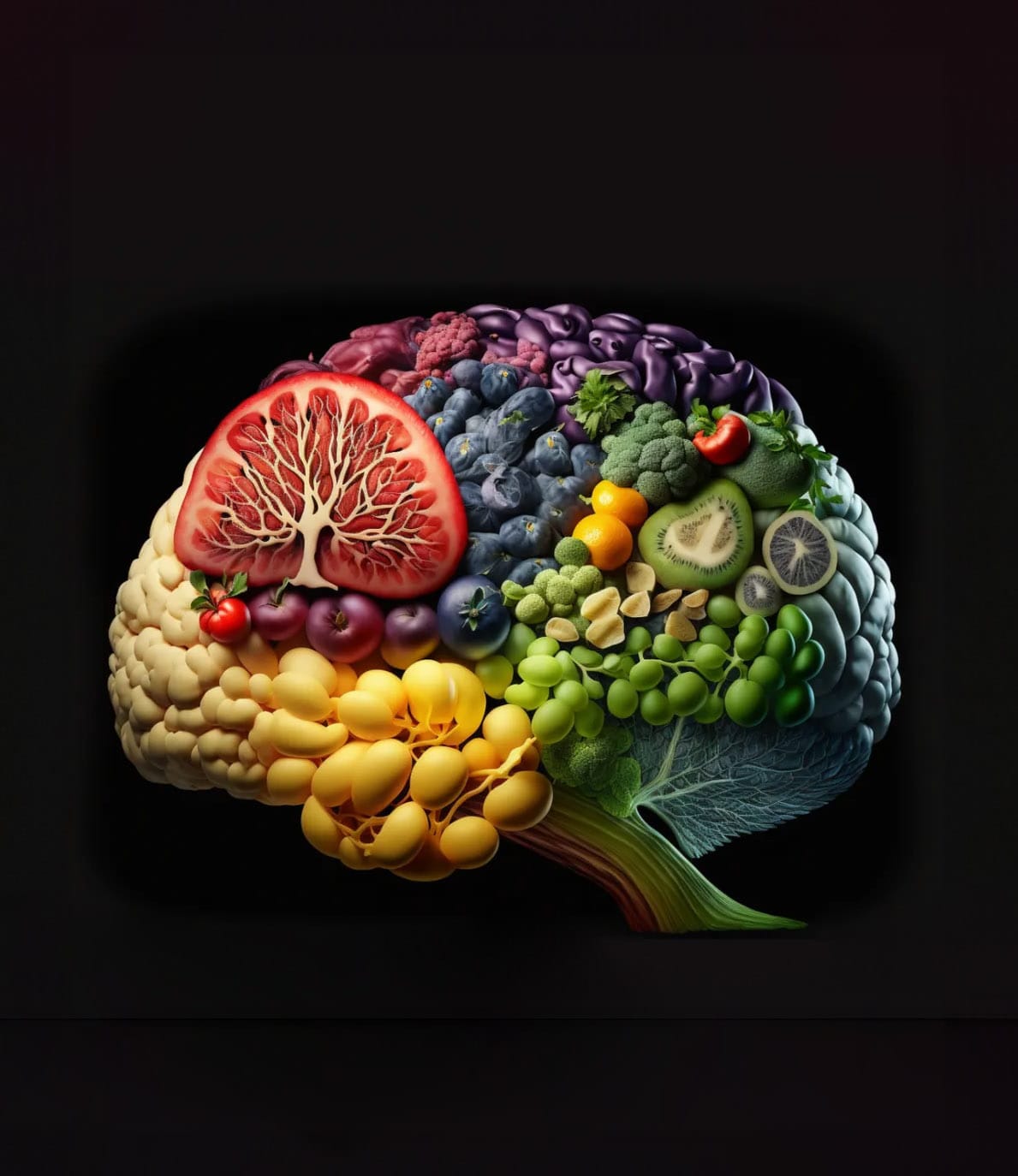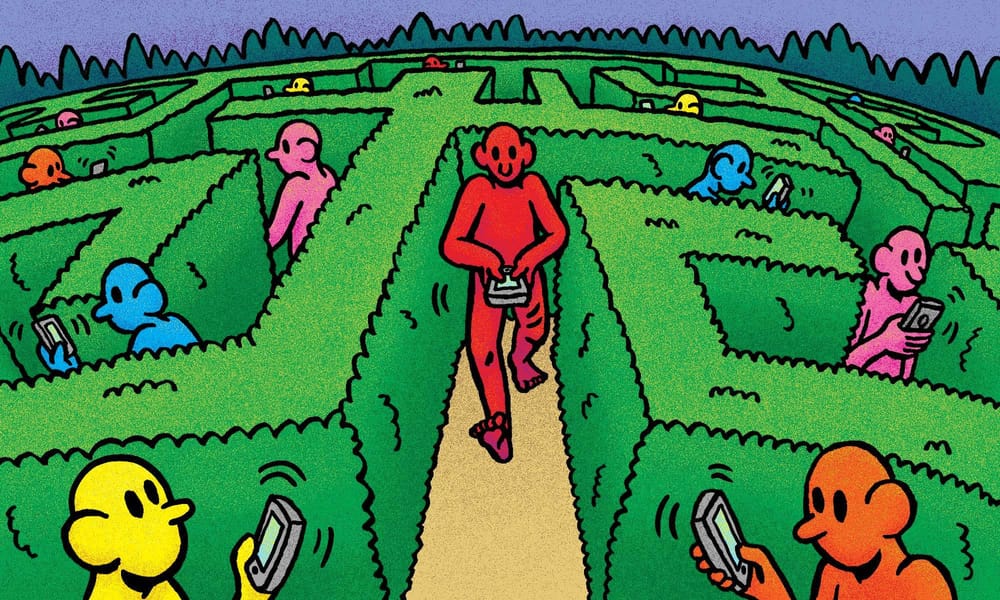
In New Zealand and the United States, one in five adults has been diagnosed with a mood or anxiety disorder, or is living with mental illness. From 2018 to 2021, the number of New Zealanders who were considered to have poor mental health rose by six percent.
Professor Julia Rucklidge, a trailblazer in the field of micronutrients and their impact on mental health, has dedicated her career to understanding why. Despite being initially taught that nutrition had little relevance to brain health during her PhD at the University of Calgary, Rucklidge's research, including her notable study on the psychological functioning of women with Attention-Deficit/Hyperactivity Disorder, catapulted her to prominence. She further shared her insights through a compelling TED Talk and co-authored the book The Better Brain with her colleague Bonnie Kaplan in 2021.
Rucklidge gained prominence through her groundbreaking research despite being initially taught that nutrition had little relevance to brain health during her PhD at the University of Calgary.
Now a professor of clinical psychology at the University of Canterbury, Rucklidge studies the role of nutrition in the expression and treatment of mental illness. She believes that not enough people get well with conventional treatments, and that is is the role of scientists to "challenge current ways of thinking about and conceptualising mental health problems, and to do the kind of research that's important to move the field forward.”
In this interview, Professor Julia Rucklidge expresses her firm belief that nutrition should take centre stage in our mental health system. She shares her insights on why she holds this conviction and emphasises the significance of prioritising nutrition in promoting optimal mental wellbeing.
Can we start with the basics, please? What are micronutrients, and what role do they play in mental health?
When we think about the activity of the brain and what is required to process emotions—to be able to stop yourself once you have an impulsive thought, or to regulate your anxiety—all of those activities require neurotransmitters. Neurotransmitters are entirely dependent on the presence of micronutrients in order to make them.
There's all this activity that's going on in all of the cells—not just exclusively in your brain but all over your body—that are nutrient-dependent in order for those metabolic activities to occur. The [micronutrient] vitamins and minerals play an essential role in providing what we call co-factors, to support enzymes that do conversions from one chemical to another. Eventually, they support the manufacture of the neurotransmitters that we're very familiar with when it comes to brain health—like dopamine or serotonin.
Micronutrients are also important for detoxification—supporting detoxification pathways, and that’s an important part overall. We are constantly exposed to pollutants in our environment that your body needs to process and get rid of, and metabolise. Micronutrients are important for those detoxification pathways as well.
They do other things such as supporting something called the methylation cycle. It’s a chemical reaction that is happening in all of our cells, that is important for the production of what's called a methyl group. Methyl groups are a carbon and three hydrogen [atoms], and they are super useful because they can attach themselves to the DNA, and have this amazing ability to turn genes up or down in terms of expression. Certain things will be made or not made as a consequence of the presence or absence of these methyl groups. In the book, I think we say they keep the genes healthy because they are so important for methylation.
Micronutrients are also important for detoxification—supporting detoxification pathways, and that’s an important part overall. When you consume things you’re exposed to pollutants, [including] when you consume a drug. All the things that your body needs to process and get rid of, and metabolise—micronutrients are important for those detoxification pathways as well.
So micronutrients are enablers of these other vital processes. How did you decide to focus so many years of your work on them?
Through doing my PhD with Bonnie Kaplan. Around the time when I was doing my PhD, she was approached by some families from Southern Alberta, Canada, who were using vitamins and minerals to treat serious psychiatric conditions like bipolar disorder, psychosis and depression. Initially she ignored it, but over time she decided to do some small clinical trials that she and others published in the early part of this century. So I was familiar with the work.
At the time, my training in clinical psychology taught me that nutrition was pretty irrelevant to brain health—which is kind of crazy that that was the teaching, but that is what it was back then and it still is, probably. I now really appreciate the importance of nutrition.
Around 2000, about two years out from my PhD . . . I came to New Zealand. A few years later, I decided to study this idea because Bonnie was publishing such interesting results. By then I’d gotten over this idea that everybody responds to psychotherapy or responds to medications, as long as they have access to the treatments. I was recognising from my own data that not enough people get well with these treatments. It's our role as scientists to be the critics and conscious of society. To challenge current ways of thinking about and conceptualising mental health problems, and to do the kind of research that's important to move the field forward.
That's what I decided to do in around 2007—to start doing clinical trials using the vitamins and minerals in a pill form, to see whether or not they could have any influence or impact on brain health, or on mental health disorders. The disorder that I decided to study was ADHD [Attention Deficit Hyperactivity Disorder] because it was something I was familiar with.
So that's what launched me into it. But over time, we kept seeing people do quite well. Not everyone does well with the nutrient intervention, but enough people were doing well that I kept doing more and more clinical trials and eventually we ended up establishing a lab, the Mental Health and Nutrition Lab.
I’ve noticed you often use storytelling as a tool in your work. Do you learn that way—does a particular story stand out for you and make you think, “Wow, this is it!”
We've seen some really big changes, some life-changing. The first case I worked on with micronutrients was with somebody who I knew really well. I'd worked with this young person with OCD [Obsessive Compulsive Disorder] quite extensively using psychotherapy, and it hadn't had a huge impact on his overall wellbeing or OCD symptoms. It had a modest impact, but he was still really impaired. Then he tried the micronutrients. The substantial shift in his OCD symptoms with micronutrients was like nothing that I observed, ever, with psychotherapy. And it was so quick.
When it works for some people, it can be a really quick transformation. You can go from a child who is temper tantruming multiple times a day, oppositional with every request, challenging to parent, challenging to teach—and then to go to a [different] place with just micronutrients. Feeding the brain and giving it the essential nutrients it requires to function, you end up with a child who copes with adversity—who can manage the stressors in life, the requests and demands that are made of them—and act like any other child who doesn't have those issues. We've certainly seen the full range of responses.
We also hear about other benefits that people will report as life-changing, like improvements in sleep, or regulation of mood, or not needing to depend on drugs or cigarettes or other illicit drugs to help them cope with the day's events. They just manage it without those extra substances. We have lots of great stories of life-changing events for people.
Both you and your colleague Bonnie Kaplan are very engaged with the media. What role does the media play in your work?
The media can amplify the message and bring information to people in a way that I could never do so, if I can, I will respond to requests. The stories that you describe, the fact that I've got stories was something that I learned very early on from my husband, [a journalist]. He said, 'You need to have someone who's going to speak to the benefit, because they are the ones who make the impact, not you.’ I might have all the data and I might have graphs, but it's always the stories, those personal stories that make the difference. Whenever we do research, I say to my students, 'You need to find some people who are willing to speak about their experience, because they're the ones who bring that experience alive, or the results alive.' Because that's what people resonate with. They don't resonate with data.
The unfortunate thing with mental health problems is that people don't always want to talk about their stories. In the early days, sometimes the media could go down the route of ridicule, as opposed to seeing this as legitimate research. I was very careful with that. I had good intuition (and good advice) in that I didn't speak about any studies until they were published. Scientists really shouldn't be talking about unpublished data. They do now; COVID really has changed things. Why are they talking about unpublished data all the time? That's certainly something I wouldn't ever engage in, talking to a journalist about unpublished work. At least when it's in a journal, it's peer-reviewed, it's out there so that if people want to read it, then they can. That's their choice.
The number of New Zealanders taking antidepressants is higher than ever, and it may have increased again since the pandemic. What do those figures mean to you?
It depends on how you look at it. You could say, 'Well, if one in four or five people are struggling with a mental health issue, then that means there's a whole bunch of people who are unmedicated.’ If it really is a treatment that works for everybody, then maybe more people should be on it. It's often an argument I've seen with prescriptions of methylphenidate for ADHD. We think it's overprescribed, but only one percent of people are taking methylphenidate and five percent of the population have ADHD. So therefore, it must be underprescribed if it is a treatment that works.
However, the large proportion of the population being on an antidepressant does worry me because the data show that antidepressants are only slightly better than placebo in treating symptoms of depression. In other words, getting better is often due to nonspecific variables, like being monitored, time, being cared for. For some people, antidepressants definitely seem to be what makes the difference and can turn lives around—so I don't want to be dismissive of the benefit that it can give some people. However, for others who are taking them, they don’t help and come with some serious side effects and problems with withdrawal. We need to acknowledge the potential for harm.
I've done research where we . . . were interested in side effects associated with taking antidepressants. A group of people who were on antidepressants were asked about their overall psychological functioning, and many of them were still unwell. So you kind of have to stop and say, 'Why are so many people unwell when they're taking a medication that's supposed to make them well?'
I think more people are aware that medications are not curing. They might make life easier to cope with, but we're not necessarily eliminating the disorder. Then you learn that it's really hard for them to come off them, and the issues relating to withdrawal. The side effects can be intolerable for people, but they can't come off the drug because it increases their anxiety. There's a whole bunch of challenges. It tells me that we're not doing a great job of addressing the crisis by just medicating people. We don't take people into our clinical trials who are medicated, so we don't even have an opportunity to help them, and that's because of the unique challenges of taking nutrients alongside medication in that nutrients might change how the body metabolises the drug.
Do you find it frustrating that you have this solution while there’s still such a focus on pharmaceuticals? How does this affect you?
There are days where it's incredibly disheartening because I get contacted by people everyday who are looking for other solutions. They've gone down the Big Pharma route and that hasn't resolved their problems. Thousands and thousands of people have come out since my TED Talk almost ten years ago. That tells me that [pharmaceuticals are] not helping enough people—and yet, if you struggle with depression, the first thing that's going to be offered is antidepressants.
Micronutrients can alleviate a lot of suffering for a lot of people without the intolerable side effects, and without the chance of struggling with withdrawal if you were to choose to come off them. It is really disheartening that it's not more mainstream and that it's not part of the conversation when you go see your general practitioner.
But, we are making small steps. In November 2022, PHARMAC [the Pharmaceutical Management Agency] made a decision that micronutrients—Daily Essential Nutrients, the formula that we've been most recently studying—can be a second-line form of treatment for ADHD. It's not a very well-known decision . . . and part of the reason I haven't made a big deal about it is that it doesn't actually change any practice. Until Daily Essential Nutrients can be regulated as a medicine, PHARMAC won't fund it. So Daily Essential Nutrients has to first be identified as a medicine in the terms of the Therapeutic Products Bill. This is one of the things that hasn’t been directly addressed with the new Bill.
I thought, 'This is our system, let's see if I can make this application and see where it goes.’ They could have said no, but surprisingly, they [said], 'Actually, there's some evidence here.’ They made [micronutrients] a second-line treatment that has to go through a psychiatrist, which is a bit of a problem in itself as psychiatrists have little training in nutrition, but it won't make a difference to New Zealanders until the company applies for it to become a medicine in New Zealand.
I naively thought that by seeing the evidence, PHARMAC might try to facilitate access to a treatment that was clearly helping so many people. But that isn’t their job, and I don’t know whose job it is.
Is the Therapeutic Products Bill going to resolve this problem, or make it worse? I’ve seen comments from people who totally support the regulation of natural health products, because there is a belief that we need to stop the snake oil salesmen selling products that have no benefit. I've got an example here of benefit but it falls through the cracks, and there isn't a good solution within the law now. I don't think that the Therapeutic Products Bill is going to resolve the problem of access and funding. In fact, it could make it worse by making it even harder to get access to nutrients that are essential for life. There are some things that you need to consume, and they could end up being restricted by being available only by a prescription.
Nutrients shouldn't be a medicine in the conventional sense of the word—ie a pharmaceutical. Micronutrients are a food: they're in your food. But the law says that because they've had therapeutic benefit, they have to be registered as a medicine. We've got this system where anything that is determined to be therapeutic has to be medicine, and has to be regulated as a medicine. So the next step in getting DEN funded is that the company have to pay a fee to Medsafe, the regulator, to register it as a medicine. Then, Pharmac might fund it, if it has the funds to do so.
I'm tired of seeing people stop nutrients—not because they don't work, but because the medication is free. They can get methylphenidate for free, but the micronutrients are something they have to pay for.
So, because medication is free, people might choose it over nutrients. Yet, you don't believe that treating micronutrients as a medicine is the solution. So how would you approach that dilemma—how can micronutrients be made affordable?
Simple. Have another funding stream through Pharmac for products identified as therapeutic but are not pharmaceuticals! But that doesn’t exist, at least not to any large scale.
Taking all this into account, what do you believe we should be teaching young people about being healthy?
The bottom line of my research is not that I think we should supplement the world. It's that I think we need to teach people that the nutritional value of their food is essential for their brain to operate at its best. The vitamins and minerals are contained within real whole foods, not within the ultra-processed products that are 69 percent of products sold in New Zealand's supermarkets.
When you look at the nutritional value of ultra-processed foods, you see that they don't really contain these vitamins and minerals that are so essential for the brain. What we can teach kids is how to identify the foods that are of nutritional value—that [are] going to help them concentrate or help them get along with their peers, not get irritable, just generally cope better with the stressors of life so that they're happier at the end of the day. And you're going to get that out of your real whole foods. You're not going to get that out of your ultra-processed foods.
In addition to that, the ultra-processed foods are going to give you other non-nutritive ingredients like artificial colours, flavours, sugars, preservatives, emulsifiers; all the numbers that are on the back of the package. And those can be toxic for brain health. So there are two reasons for not consuming those foods. One of them is that they lack vitamins and minerals and the other is that they contain things that are toxic to your brain, like too much sugar.
The Therapeutics Products Bill is relevant to all New Zealanders in that we don't know what impact this is going to have on access to natural health products that, for some people, are essential because you can't necessarily get it out of your food. We should care about that. Can we trust a regulator whose primary purpose is regulating patentable pharmaceuticals?
Given your concerns with the bill, what do you see as the dream solution?
Get the government to recognise that the current UPF food environment is contributing to the mental health crisis and that some nondrug solutions can make a huge difference to many—figure out what the legislative and funding barriers are, and remove them.







